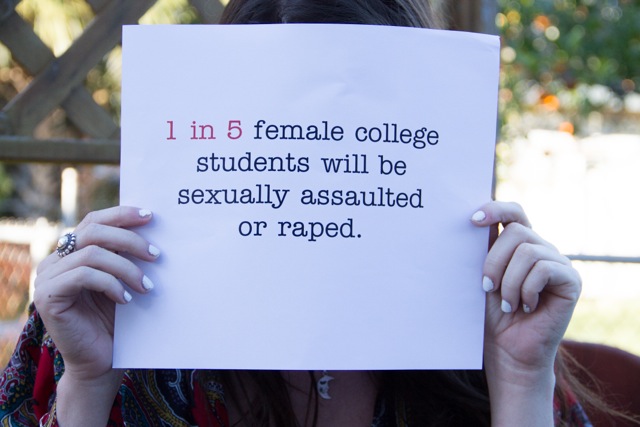By Alexa Epitropoulos | gargoyle@flagler.edu

Caitlin Rodgers*, then a student at Christopher Newport University, felt comfortable around the man that her friend brought to their sorority formal that night. When she was locked out of her dorm room, she had no reason not to trust him.
“He was my friend’s really good friend. They trusted him. He was well known on campus for being a cool guy,” Rodgers said. “I thought everything would be fine.”
When he persistently made advances toward her and ignored her when she said no, the situation quickly escalated. Rodgers found herself trapped in a room with someone nearly twice her size, who pushed her out of his room the following morning. Worse yet, Rodgers found little support in the aftermath of her rape—from her friends or her college.
“My school is notorious for pushing this stuff under the rug,” Rodgers said. “I can’t tell you how many girls have told me that they reported it and nothing ever happened.”
What happened to Rodgers is not limited to her or even her campus, though—it is found on college campuses across the United States. Women attending college are the most at risk group when it comes to rape and sexual assault—and they’re also the ones reporting it the least.
One out of every five female college students has been sexually assaulted, according to a recent White House report. According to the same report, a meager 12 percent report rape and sexual assault to college administrations.
And though two-thirds of rape victims know their attackers, in most cases, rapists remain faceless and nameless.
Students are often afraid to come forward and file an official report. That’s caused by the uneven track record college administrations have with handling sexual assault.
When rape or sexual assault is reported, there is no guarantee that the school will take action. Many schools don’t have a designated policy for sexual assault or a victim’s bill of rights. Few rapists are arrested or held accountable. Only 10 to 25 percent of male college rapists are expelled, according to a 2010 Center for Public Integrity study.
Rodgers was one of the many who decided against reporting her rape to the administration. She, like many others, was afraid. She was also abandoned by close friends when she needed them the most. She went through turning in a rape kit, being questioned by the police and purchasing Plan B, an emergency contraceptive agent, on her own.
“I didn’t have support when I really needed it,” Rodgers said. “At my school, there wasn’t a help center if you were a victim. There’s no sort of victim education or anything related to that.”
According to Ruby Hauder, the sexual assault victim coordinator at the Betty Griffin House, victims of sexual assault frequently experience more than just emotional trauma.
“They think nobody will believe them. They think it’s their fault. They think other people will shun them, make fun of them,” Hauder said. “They’re concerned about what they’re going to see on social media. They’re feeling negative about themselves.”
That is worsened by the fact that women who report rape and sexual assault are blamed and not taken seriously by law enforcement or college administrations.
“We often leave accountability and responsibility out of our discussion and that’s something everyone can start doing,” Hauder said.
Hauder’s point gets to the heart of why victims often don’t come forward. Rapists walk away with unblemished records and reputations, while rape victims are suspected of lying and alienated from friends, even family. We refuse to teach our sons about rape and, instead, tell our daughters to be careful of what they wear, how much they drink.
Women who talk about their experiences openly are forced to contend with a culture that blames women and venerates their oppressors. Rapists are often described as “promising students”, while victims are grilled by law enforcement about what they did to bring it onto themselves.
In any other crime, the victim is likely to be empathized with. When it comes to sexual assault, the tone changes dramatically. College women decide against reporting rape not because they are afraid to expose a secret, but because it is often unclear if anything will come of it.
For Rodgers, how her situation was handled is more painful than the sexual assault itself. No longer at the same school, she is now encouraging others to report and publicly talk about sexual assault and rape.
“There is such a negative stigma on sexual assault,” Rodgers said. “It couldn’t be any less of a victim’s fault, but the victim is the first person that is blamed. That’s something that needs to change.”
*Editor’s Note: Name has been changed to protect the identity of the victim.





Be the first to comment on "Fear to report rape rampant on college campuses"